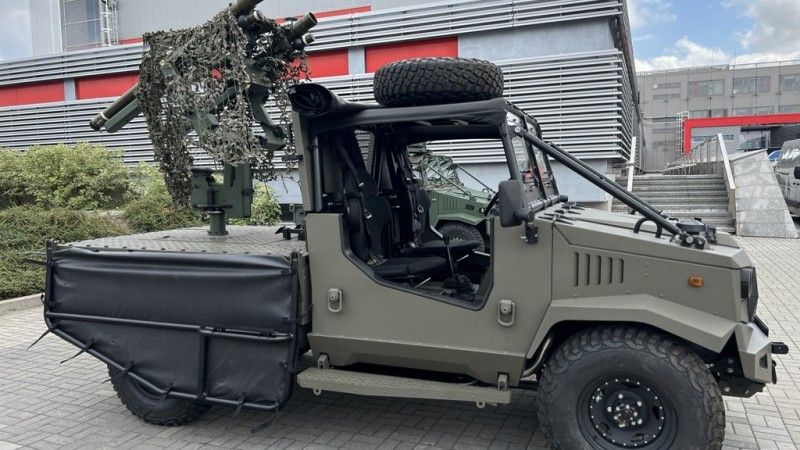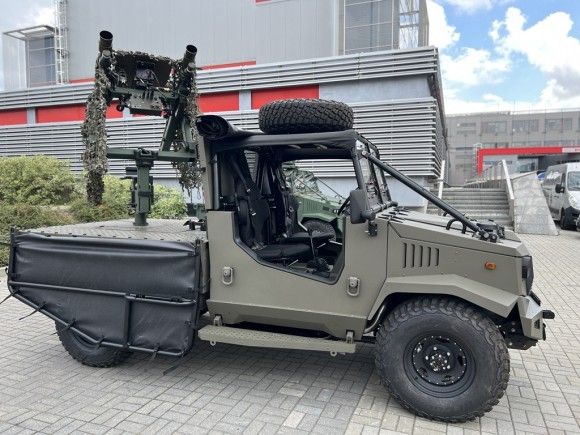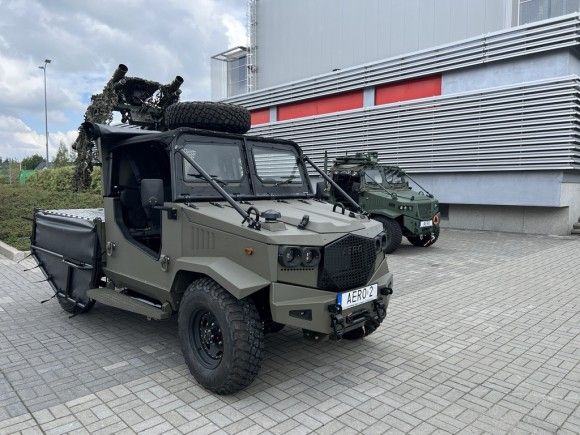MSPO 2023: Polish VSHORAD "Crossbow" for Airborne Operations

Photo. Defence24.pl
During this year’s fair of MSPO 2023, the Kusza light anti-aircraft system on the modernized Aero 2 high mobility vehicle, derived from the design used and highly rated by the Polish Aeromobile Forces, has its premiere.
The Kusza (eng. Crossbow) Mobile Missile System (MMS) is a very short-range anti-aircraft system, developed by Centrum Rozwojowo-Wdrożeniowe Telesystem-Mesko Sp. z o. o. from Lubiczów near Warsaw. This system is armed with two Piorun Portable Anti-Aircraft Systems launchers (with a range of 400 m to 6.5 km and the ability to engage targets at a height of 10 m to 4 km) that are immediately ready for use. PPZR Piorun (Piorun MANPADS) is produced by Mesko in Skarżysko in cooperation with CRW Telesystem-Mesko.
In addition, there are another 2 Piorun in the on-board storage along with Ground Power Blocks and a manual Start Mechanism. Older Grom missiles can also be used in the system. Kusza can therefore fight against planes, helicopters, as well as cruise missiles and unmanned aerial vehicles - all these types of targets are successfully fought by the Polish Pioruns in Ukraine, also in very difficult conditions.
The Kusza set was designed to be integrated on light vehicles with a gross weight of up to 3.5 tons. The development of the system is the result of an analysis of experiences from the 2008 war in Georgia, when the Polish Grom MANPADS, carried by shooters on quads, were successfully used in combat. However, the analysis of Georgian experience showed that there is a need to enable firing directly from the vehicle, greater mobility of the anti-aircraft system, and to provide the operators of the portable systems with more effective observation systems.
The key element of Kusza is the management-observation-targeting module integrated with the launchers, developed by CRW Telesystem-Mesko. The sights are integrated with the LCD monitor (emergency possibility of using a collimator sight or a mechanical sight), which displays the image from a thermal or daylight camera. Thanks to this, Kusza can be used in all weather conditions, day and night.

Photo. Defence24.pl
At the same time, the set can be equipped with the IFF system, it also allows you to receive an initial indication of the target from the integrated air defence system and be additionally equipped with an infrared alerter. Kusza can therefore operate autonomously (which is particularly important, for example, in the case of the Airmobile Forces) or in an integrated air defence system.
In this way, a light and inexpensive anti-aircraft system with high combat capabilities was built. Compared to the use of only anti-aircraft systems fired from the shoulder, Kusza gives the possibility of much longer duty in combat readiness, as well as greater mobility and ergonomics of work. It is also characterized by a very short response time to a threat, around 5 seconds. The transition from the transport position to the combat position takes less than 20 seconds, and the start of leaving the position after shooting - about 10 seconds.
The Kusza Mobile Missile System is also equipped with a set of batteries that allow the anti-aircraft system to be powered for several days without turning on the host vehicle's engine. This allows you to reduce the signature of the anti-aircraft kit and limit the risk of detection, because all Kusza MMS sensors are completely passive. Of course, the Kusza set also gives the possibility of using the transported Piorun and Grom anti-aircraft systems for firing from the shoulder, if the conditions on the battlefield require it.
The Kusza set presented at this year's MSPO has been integrated with the Aero 2 vehicle, a development version of the vehicle used by the 6th Airborne Brigade.

Photo. Defence24.pl
Aero 2 was developed by Auto Podlasie Sp. z o. o. The body has been completely redesigned, leaving the proven and reliable drive system and engine unchanged. The vehicle has an increased wheelbase, an enlarged driver's cabin and an elongated bonnet. The cargo box was designed for the installation of the Kusza System, along with the possibility of transporting a supply of four rockets in the storage.
Both the Aero and Aero 2 are adapted to be deployed by air, parachute landing and carried on a helicopter sling. Aero vehicles are the first systems of this type in the Polish Army in several decades, that can be successfully parachuted.
The configuration of the Kusza sets, shown for the first time in Kielce, is offered to units of the Aeromobile Forces, other types of troops using PPZR Piorun/Grom and an increasing number of foreign customers of PPZR Piorun. Until now, their anti-aircraft defence was based on Grom and Piorun portable launchers as well as artillery and artillery-barrel sets with 23 mm cannons.
After the introduction of the Kusza airmobile units into service, their anti-aircraft defence can be significantly strengthened. It could be the first mobile anti-aircraft system in their equipment, and at the same time adapted to be deployed by air. The introduction of Kusza would increase the autonomy of airborne units and air cavalry operations. At the same time, thanks to the use of a chassis similar to the vehicles already in use, it will be possible to take advantage of the existing training and logistics system. The Aero 2 vehicle also has a number of other applications.
In turn, the Kusza MMS can also be integrated on other platforms. The Kusza system can therefore be an important supplement to air defence for light infantry subunits (including the Territorial Defence Forces), but also for air defence systems intended for critical infrastructure or troops, command posts, etc. The Kusza MMS can also operate in an integrated air defence system, as well as in cooperation with the non-kinetic systems, Counter-UAS using identical sources of information about the situation in the air at low and very low altitudes.
WIDEO: Defence24 Days 2025: Premier Defence & Security Conference in CEE